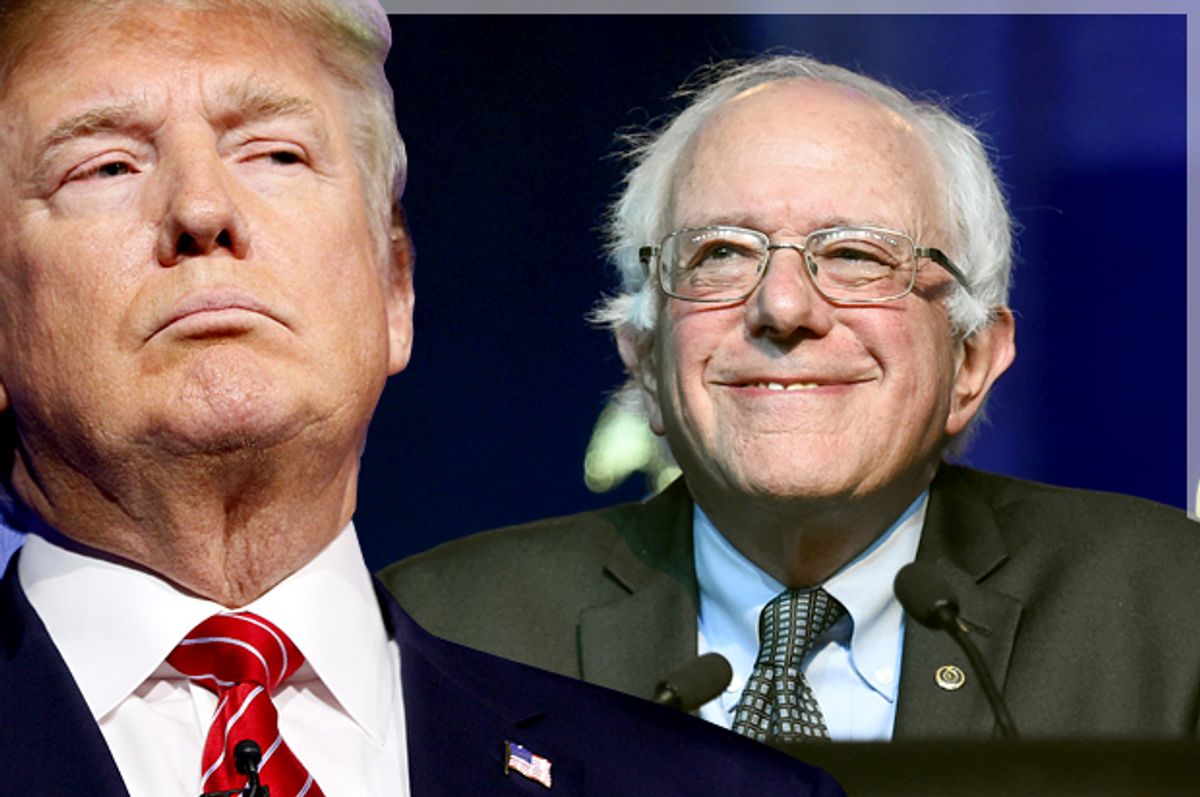After winning Tuesday’s primary in Indiana, Donald Trump has officially become the presumptive Republican nominee, and thus, pundits and publications have begun mourning (or celebrating) the death of the Grand Old Party. Top Republican figures have already come out in opposition to Trump’s GOP, while others have even declared support for Hillary Clinton.
While it may be a bit too early for liberals to begin gloating (let’s try not to lose sight of the fact that the Republican Party still controls the majority of state legislatures), the nomination of Trump is indeed a political gift for the Democrats, and his ability to repel the more elite and educated Republican voters may well trigger a mass exodus. His repugnant personality may even help Democrats retake the Senate, where there are multiple Republicans up for reelection in blue-leaning states.
Of course, Democrats would be remiss to ignore the fact that their candidate is almost as unpopular as Trump according to favorability ratings. (On average, Trump has a 60/35 unfavorable rating, while Clinton has a 54/42 unfavorable rating.) Most Americans simply don’t trust Clinton — but as Nate Cohn writes in the New York Times:
“A majority of Americans may not like [Clinton], but they say they’re scared of [Trump].”
The fact that many will vote for someone they don’t trust because the other candidate is too horrifying is not a very encouraging sign about American democracy -- but this is the reality of a post-Citizens United America. Unless Trump can convince a majority of voters that he is neither bigoted nor mentally unstable in the next six months, Clinton will be reciting the oath of office come next January.
But the billionaire is already planning something of a general election strategy. While Clinton may end up receiving a lot of disillusioned Republican votes, Trump seems to believe he can appeal to disgruntled Sanders supporters. On Monday, he gave something of a pitch to these (predominately) young voters on Fox News’s "Hannity":
“I think a lot of the young people that are with Bernie Sanders are going to come to my side because they want jobs. Bernie Sanders and I agree on one thing, trade, that we don’t know what we’re doing on trade. The difference is, I’ll make great deals out of it [and] he doesn’t know what to do. The people that are with Bernie Sanders, the young people, I really believe they’re going to come over and vote for me. I think we’re going to have a lot of crossover.”
On the surface, this may seem reasonable enough. A sizable percentage of Sanders supporters have already said that they will not be voting for Clinton in November (although minds can change in six months, of course), and Trump has been very critical of trade deals, as has Sanders.
Of course, once you look past the surface, the concept of voting for Trump should seem preposterous to all Sanders supporters. (If progressives can’t bring themselves to vote for Clinton, it is much more rational to vote for Jill Stein, write-in Sanders, or simply stay home.)
Even on the trade issue, Sanders and Trump have completely different perspectives and solutions. Trump has used free trade as another way to scapegoat foreigners and other countries, as if everything comes down to Us vs.Them, while Sanders understands that free trade deals like NAFTA and TPP are a product of the corporate capitalism and the incessant drive for lower wages and investment protections. Trump has frequently opined that American leaders don’t know what they’re doing when negotiating trade deals — which means he is either stunningly naive or bullshitting as usual. American leaders know exactly what they’re doing when it comes to trade, as do the corporate lobbyists and trade representatives who advise them.
This is the fundamental difference between Sanders and Trump: One operates in reality, while the other operates in his own fantasy worl. They have both been labeled populists by the media, but only one of them has identified the real problems with the status quo. Trump has run a campaign on pseudo-issues, like a good culture warrior -- protesting liberal elites and political correctness; promising to deport millions illegal immigrants (even though more undocumented immigrants have been deported under the Obama administration than any other president); scapegoating minorities and foreigners. Sanders, on the other hand, has run on real issues affecting the people, such as economic inequality, the power of big monied interests in politics, the broken criminal justice system and America’s obscene prison population, and so on.
To put it succinctly: Sanders is a populist, Trump is a fraud.
A Trump presidency would be a disaster for the United States, and Sanders supporters — at least the overwhelming majority of them — no doubt understand this. This doesn’t mean that all of them will quickly line up to support Hillary. But voting for a nativist demagogue would be an affront to Sanders and the movement that has formed around his candidacy over the past year.

Shares